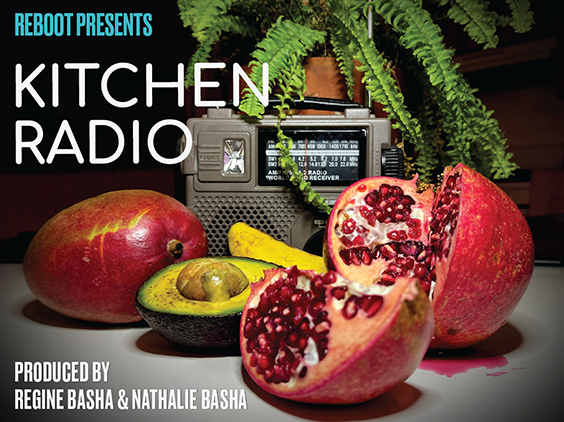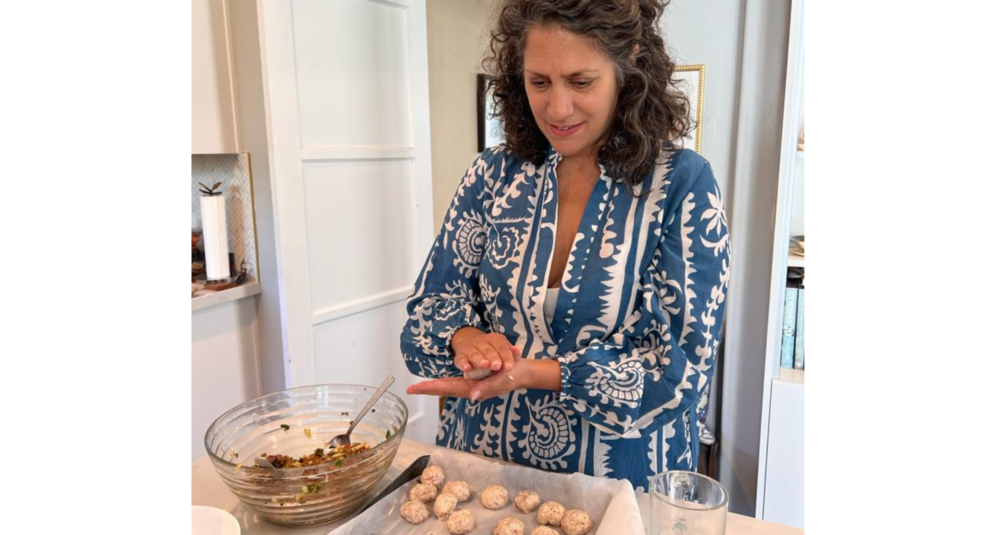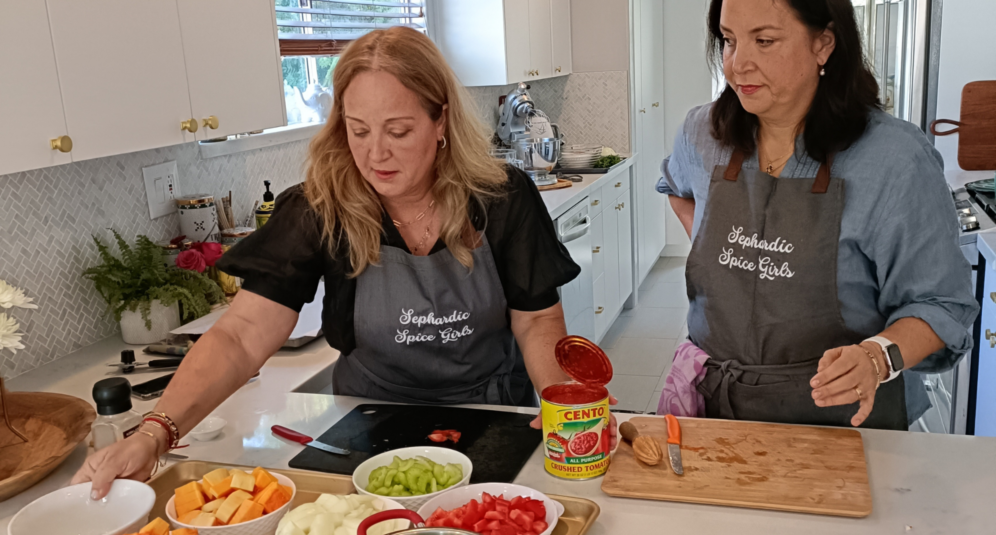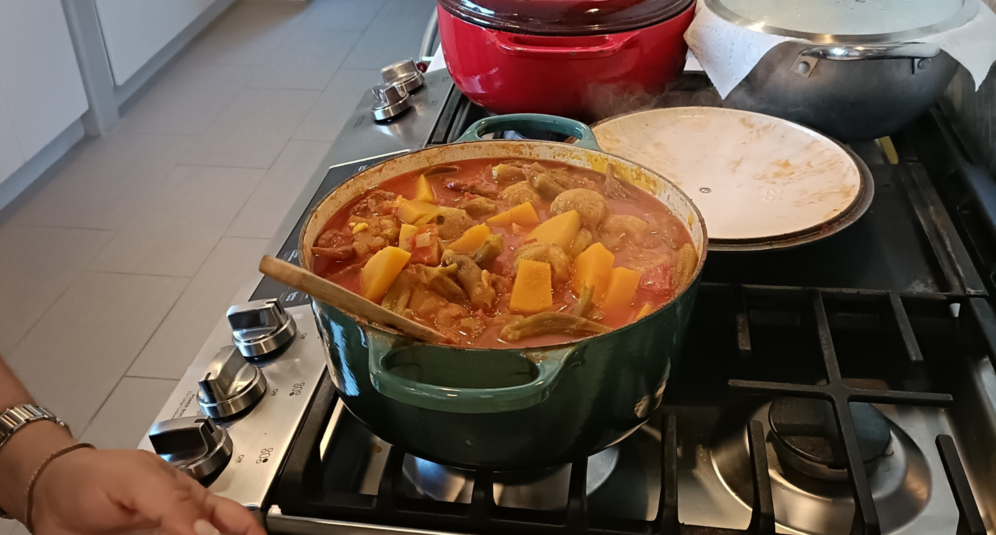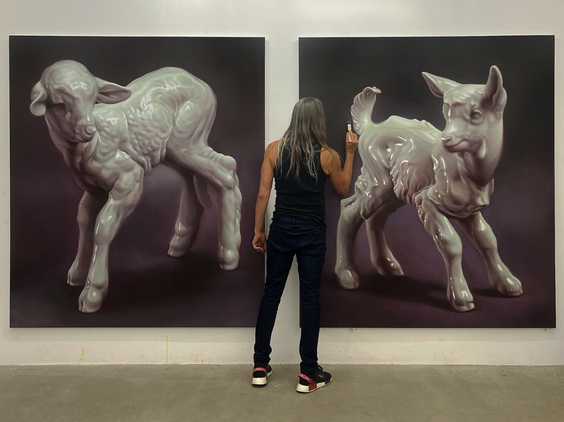Take a Seat at the Table
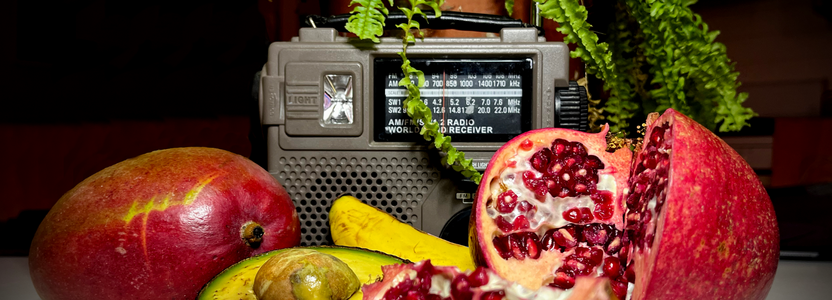
Regine Basha (Founder of Tuning Baghdad) and Nathalie Basha (The Travel Muse) with Reboot, launched the Kitchen Radio podcast in April, bringing listeners to the table of communities of Iran, Iraq, Syria, Lebanon, Egypt, Morocco and Tunisia. The podcast delves into intergenerational stories of community life and ritual practices from guests who are part of a rising renaissance of creative food projects exploring their oft-overlooked Jewish history and heritage from this region. Find out more below and here. Feature photo by Valerie Tevere+Angel Nevarez.
Sometime over 20 years ago I went to Istanbul for the first time and while sitting at a restaurant, to my great surprise on the menu I saw Bamia, a dish that in my mind only my Iraqi Jewish family made! Bamia is simply okra in Arabic but in the special dish, it is cooked in a kind of tangy sweet and sour stew. My aunts often made it with Kubba, a meatball dumpling of sorts, and called it “Kubba Bamia,” which is a very beloved Iraqi Jewish dish often served at Shabbat dinners.
Seeing this at a Turkish restaurant suddenly awoke me to the fact that we had also been part of a much larger Ottoman cultural umbrella. This became especially clear after witnessing such rituals as drinking black tea in a “stikan” (small cup) with two sugars and tinkling the cup with a tiny silver spoon, which everyone in my house did, or the practice of playing backgammon outdoors at coffee shops and calling out the dice, just like my father did. Needless to say, I felt very at home.
Then when I traveled to Cairo for the first time, I had an even deeper familial sense – this time through the music in the coffee shops. Hearing songs by Uum Khalthoum, Abdul Wahab, Warda, which my dad, who loved music, used to listen to while taking a shower, hit me with a sense of connection. Navigating “Jewish-ness while Arab” or “Arab-ness while Jewish” is a complicated life-long process of unpacking, not only because of the political arena that stands against this seeming duality or binary, but also for the social, cultural and personal connective ties that remain in disrepair. In my experience growing up in North America, when people, including Jews from Ashkenazi backgrounds, encounter you as an Arab Jew, it’s often with total confusion and lack of historical context.
Later after grad school, I found a stash of home movies and cassette tapes that reminded me of the vibrant family and community parties we had growing up in Montreal. I began collecting the materials from others as well and scanning and digitizing them – which led to a digital archive project called Tuning Baghdad, a personal and historical series of narratives about Iraqi-Jews and their largely erased contribution to Iraq’s music scene before they left the country. This project, realized in the mid-naughts, ended up magnetizing a lot of people to me – both Jews and Arabs (and Arab Jews) of varying ages and middle-eastern backgrounds. One of those people was the artist Michael Rakowitz, who himself was exploring the rupture that his Iraqi-Jewish family went through. He began cooking dinners based on his grandmother’s recipes (and through research with people like Claudia Roden) about the same time as I was doing research. Later on I joined Michael’s cooking “troupe,” together with cultural theorist Ella Shohat, and together we toured a narrative dinner event called Dar Al Sulh.
The term Dar Al Sulh refers to a historical territory where an agreement between Muslims and non-Muslims has been made and provides freedom of religion, autonomy, and protection. It is this agreement that applied to Jews in Iraq, and elsewhere in the Middle East. Dar Al Sulh has since toured from Dubai to London to Los Angeles and continues to be a great source of intermingling and shared cultural experience through food.
Fast-forward to today, when story-telling and food has become one of the most effective and precious ways to learn about culture and also about culture’s own viral movement across the world. Nothing speaks more to both the specificity of family and community but as well to our own way of intermingling across borders through shared taste – spices, flavors, rituals at the table, etc… I know there are a million food podcasts and blogs out there, but I felt we needed to do one about the food of Jews from Arab and Persian lands.
Enter my niece Nathalie Basha, a broadcast journalist and story-teller who had been, for over a decade, producing her own online travel and food related shows under the YouTube channel The Travel Muse. Through our joint love of food and family stories, and through our research and following on Instagram, we cooked up a podcast, Kitchen Radio. Our goal is to focus on a specific dish from a specific Jewish Arab or Iranian community and take the rest from there. We chose a pretty intergenerational mix of guests in order to get different stories and perspectives. Some have revived recipes from their grandparents (Tannaz Sassooni and Rafram Chaddad), some had lived experience in the region and have become leaders in their food world (Claudia Roden, The Sephardic Spice Girls), and some have gone back to the region to immerse themselves in the history of food and Jewish life (Rafram Chaddad).
The four episodes are completely different, but all of them will surely make you salivate. Some go a bit more into socio-political frameworks, others focus mainly on the travels of recipes and food sources, while others focus more on holiday rituals. From Baghdad, to Kashan, to Rhodes, to Casablanca, to Tunis, to Aleppo, we are diving deep into the regional differences of flavors and culinary histories, hoping our listeners will want to follow, share and cook these specialties themselves. For us, it’s not about being nostalgic per se, but more about a resistance to amnesia about this grand swath of Jewish history throughout the Middle East.

